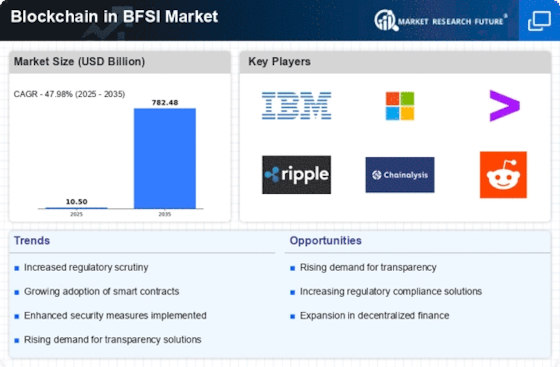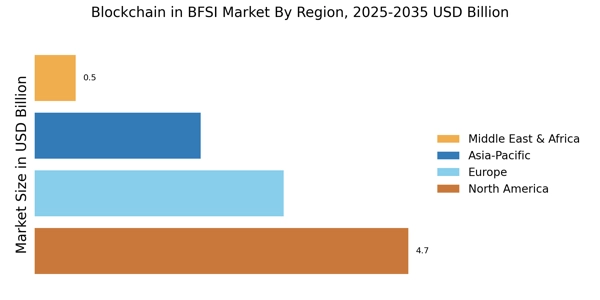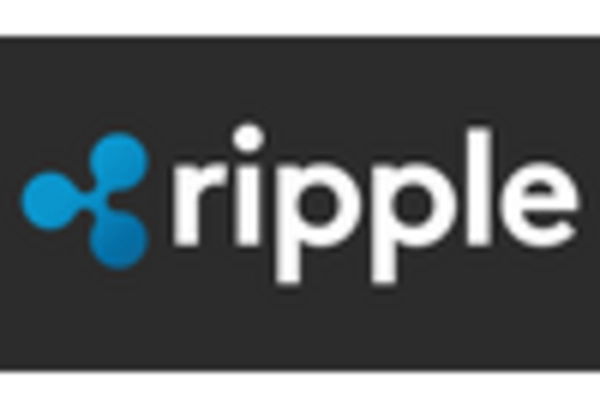Enhanced Security Protocols
Security concerns are paramount in the financial sector, and the Blockchain in BFSI Market is addressing these challenges through advanced security protocols. Blockchain technology inherently provides a secure framework for transactions, utilizing cryptographic techniques to safeguard data integrity. This is particularly relevant in an era where cyber threats are increasingly sophisticated. The decentralized nature of blockchain reduces the risk of data breaches, as there is no single point of failure. Financial institutions are likely to adopt blockchain solutions to bolster their security measures, thereby protecting sensitive customer information. As a result, the Blockchain in BFSI Market is expected to grow as organizations prioritize security in their digital transformation strategies.
Increased Demand for Transparency
The Blockchain in BFSI Market is witnessing a pronounced demand for transparency in financial transactions. As stakeholders increasingly seek to understand the flow of funds and the integrity of transactions, blockchain technology offers a decentralized ledger that enhances visibility. This transparency is particularly crucial in combating fraud and ensuring compliance with regulatory standards. According to recent estimates, the adoption of blockchain solutions could reduce operational costs by up to 30%, thereby attracting more financial institutions to explore its potential. The ability to provide real-time data access to all parties involved in a transaction fosters trust and accountability, which are essential in the financial sector. As a result, the Blockchain in BFSI Market is likely to expand as institutions prioritize transparency in their operations.
Regulatory Compliance and Standardization
Regulatory compliance is a critical factor influencing the Blockchain in BFSI Market. As financial institutions navigate complex regulatory landscapes, blockchain technology offers a means to ensure compliance with various legal requirements. The immutable nature of blockchain records provides a reliable audit trail, which can simplify the process of meeting regulatory obligations. Furthermore, as governments and regulatory bodies begin to establish clearer guidelines for blockchain usage, financial institutions are likely to embrace these technologies to align with compliance standards. This trend suggests that the Blockchain in BFSI Market will continue to evolve as institutions seek to leverage blockchain for regulatory adherence while enhancing their operational frameworks.
Cost Efficiency and Operational Streamlining
Cost efficiency remains a pivotal driver in the Blockchain in BFSI Market. Financial institutions are increasingly recognizing the potential of blockchain technology to streamline operations and reduce costs associated with traditional banking processes. By automating tasks such as reconciliation and settlement, blockchain can significantly minimize the need for intermediaries, which often incur substantial fees. Reports indicate that implementing blockchain solutions could lead to a reduction in transaction costs by approximately 50%. This financial incentive is compelling for banks and other financial entities, prompting them to invest in blockchain initiatives. Consequently, the Blockchain in BFSI Market is poised for growth as institutions seek to enhance their operational efficiency while simultaneously lowering expenses.
Innovation in Financial Products and Services
The Blockchain in BFSI Market is experiencing a surge in innovation, particularly in the development of new financial products and services. Blockchain technology enables the creation of decentralized finance (DeFi) solutions, which offer alternative lending, borrowing, and investment opportunities. This innovation is attracting a diverse range of participants, from traditional banks to fintech startups, all eager to capitalize on the benefits of blockchain. The potential for creating smart contracts and automated processes is reshaping how financial services are delivered. As a result, the Blockchain in BFSI Market is likely to expand as institutions explore innovative solutions that cater to evolving consumer demands and preferences.

















